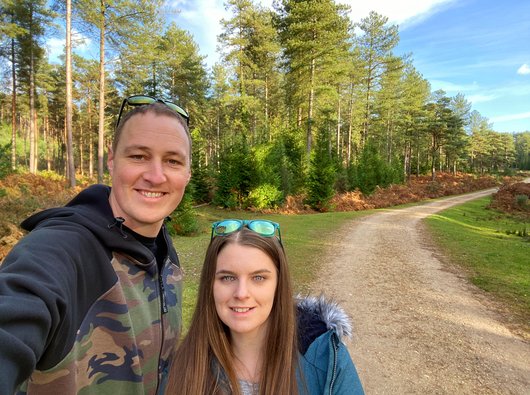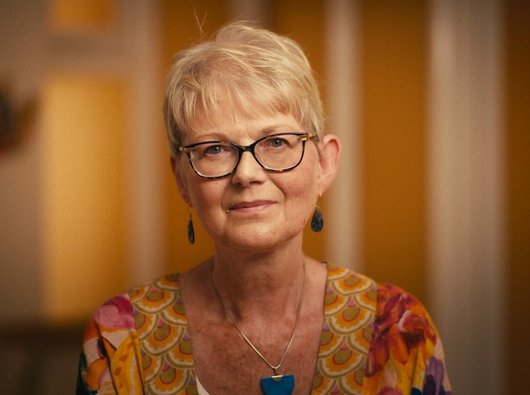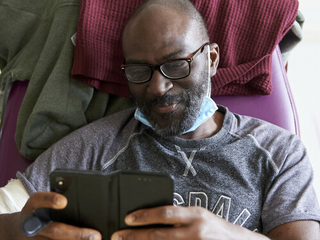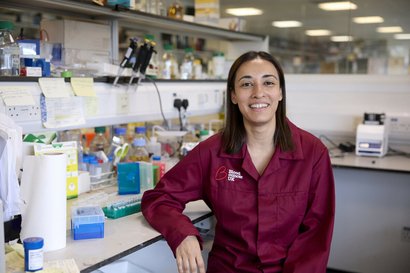What is CAR T-cell therapy?
CAR T-cell therapy is a new type of cancer treatment that uses the immune system to kill cancer cells. In some cases it has cured people where all other treatments have failed.
How CAR T-cell therapy works
CAR T-cell therapy works by taking some T cells (blood cells that help to protect you from infection and disease) out of your blood, genetically modifying them in a lab so they are much better at finding and killing cancer cells, and then putting them back into your blood to fight the cancer.
Research has shown that CAR T-cells can remain in the body and continue to be active for a long period of time. So, unlike many other blood cancer drugs, CAR-T therapy is designed to be a one-time treatment.
- Professor Karl Peggs
How is CAR T-cell therapy given?
There are several stages in the process of having CAR T-cell therapy, which takes several weeks:
- T cells are taken from your blood, using a tube inserted into a vein in your arm. This takes two to three hours.
- T cells are taken to a laboratory and genetically modified, turning them into CAR T-cells. This takes two to three weeks.
- CAR T-cells are put back into your bloodstream, through a drip. This takes around 15 to 30 minutes.
- CAR T-cells attack and kill cancer cells in the body. You will be closely monitored after having CAR T-therapy.
- Most people stay in hospital for between 10 and 28 days. The length of your stay will depend on things like what type of blood cancer you have, which type of CAR T-cell therapy you received, and how far away from the hospital you live.
Find out more about having CAR T-cell therapy and recovery.
"CAR T-cell therapy gave me a third chance at life"
When acute lymphoblastic leukaemia (ALL) came back for a second time, Grant had successful treatment with CAR T-cell therapy.

Who can have CAR T-cell therapy?
Updated 24 February 2025
In the UK, people with the following types of blood cancer may be able to have CAR-T cell therapy, if they meet certain conditions. In many cases, CAR T-cell therapy needs to be given through the Cancer Drugs Fund or another patient access scheme.
B-cell acute lymphoblastic leukaemia (ALL)
For children and adults with B-cell ALL, CAR T-cell therapy can be given if treatment has not worked, or the ALL has come back after treatment.
Diffuse large B-cell lymphoma (DLBCL)
For adults with DLBCL, CAR T-cell therapy can be given if any of these things apply:
- the lymphoma has continued to grow after at least two treatments
- the lymphoma has returned within a year of a first treatment with chemo-immunotherapy
- the lymphoma is resistant to first treatment with chemo-immunotherapy.
Follicular lymphoma (stage 3B)
CAR T-cell therapy may be used for adults with stage 3B follicular lymphoma if the lymphoma returns within a year of first-line treatment with chemo-immunotherapy, or is resistant to first-line treatment with chemo-immunotherapy.
High-grade B-cell lymphoma (HGBL)
CAR T-cell therapy may be used for adults with types of high-grade B-cell lymphoma, if the lymphoma has returned within a year of a first treatment with chemo-immunotherapy, or it is resistant to first treatment with chemo-immunotherapy.
Mantle cell lymphoma
For adults with mantle cell lymphoma, CAR T-cell therapy can be given if the lymphoma has continued to grow after two prior treatments including a Bruton’s tyrosine kinase (BTK) inhibitor such as ibrutinib.
Primary mediastinal large B-cell lymphoma (PMBCL)
For adults with PMBCL, CAR T-cell therapy can be given if any of these things apply:
- the lymphoma has continued to grow after at least two treatments
- the lymphoma has returned within a year of a first treatment with chemo-immunotherapy
- the lymphoma is resistant to first treatment with chemo-immunotherapy.
Can everyone with these conditions get CAR T-cell therapy?
Unfortunately not. Right now, CAR T-cell therapy is only a treatment option for certain blood cancers that haven’t responded to other standard treatments. There is also a high risk of side effects, so you will only be able to have the treatment if you are fit and well enough. Your hospital team will take a number of factors into account when assessing your fitness, including any other health conditions you have and the results of tests.
How to get CAR T-cell therapy if you're eligible
If you think you may be eligible for CAR T-cell therapy and want to find out more, speak to your healthcare team.
If you are eligible, your doctor will refer you to both a local and a national CAR-T panel. The panel prioritises people eligible for CAR T-cell based on their fitness and severity of the cancer.
Find out more about CAR T-cell therapy on our forum
People are discussing their experiences of CAR T-cell therapy and sharing information on our community forum.
Types of CAR T-cell therapy
There are currently five types of CAR T-cell therapy being used in the UK, made by four different companies. They are called:
- Aucatzyl (obe-cel or obecabtagene autoleucel)
- Breyanzi (liso-cel or lisocabtagene maraleucel)
- Kymriah (tisagenlecleucel)
- Tecartus (brexucabtagene autoleucel)
- Yescarta (axicabtagene ciloleucel).
How safe is CAR T-cell therapy?
The CAR-T treatments approved for use in the UK have been through rigorous trials to make sure they’re as safe as possible for eligible patients. However, CAR T-cell therapy is still a new treatment and we’re learning with each clinical trial how to make it more effective.
As with all cancer treatments, there are benefits and risks. As CAR T-cell is a new treatment, we don’t yet know if there are any longer-term risks.
What are the possible side effects of CAR T-cell therapy?
CAR T-cell therapy is still new and can cause some serious side effects. This is why the treatment is only done in specialist hospitals that have an expert team to manage these if they do occur.
Read more about possible side effects of CAR T-cell therapy.
How effective is CAR T-cell therapy?
The CAR-T treatments being used in the UK have been shown to be better at getting people into remission than existing treatments. However, the evidence is still limited to the trials that have been done with specific groups of patients. We don’t know how well CAR T-cell therapy works in large numbers of people, and we don’t know how well it works in many types and stages of blood cancer.
Because CAR T-cell therapy is a new treatment, we also don’t know what the longer-term impact is, in terms of response, survival and side effects.
"I'm so grateful I was able to have CAR T-cell therapy"
Jacquie was diagnosed with diffuse large B-cell lymphoma (DLBCL), a type of non-Hodgkin lymphoma, in August 2019. She had CAR T-cell therapy in February 2022, and has been in remission ever since.

What CAR-T trials are currently happening in the UK?
In addition to the CAR-T treatments explained here, which are now being used on the NHS, there are multiple other CAR-T treatments still being researched in clinical trials. They are looking at how to use CAR T-cell therapy to treat leukaemias, lymphomas and myeloma.
If you want to know more about clinical trials you may be eligible for, speak to your healthcare team.
For help understanding and accessing clinical trials, contact our Clinical Trials Support Service.

Speak to our Clinical Trials Support Service
Our experts in clinical trials and blood cancers provide personalised support around understanding which clinical trials are available - whether you're a patient, carer or healthcare professional.
What are Blood Cancer UK doing?
We’re funding clinical trials into CAR-T so we can develop the treatment and make it available to more people.
We supported the appraisal process for the new CAR-T treatments, helping to get them approved for use on the NHS for people with blood cancer.
Now that some CAR T-cell therapies are being rolled out, we’re monitoring uptake closely, speaking to people who’ve had the treatment and the clinicians involved in their care. We want to understand how effectively it’s working and whether there are things that need to change to improve peoples’ experiences in future.
Keep up-to-date with CAR-T
We’ll keep this web page up-to-date with the latest information on CAR-T, and we’ll keep you informed about any changes or breakthroughs through our news and social media.
Our thanks
Thank you to Professor Karl Peggs for working with us to produce the written content on this page.
Professor Peggs is Scientific Director of the National Institute for Health Research (NIHR) Blood and Transplant Research Unit in Stem Cells and Immunotherapies, and Medical and Scientific Director of the Sir Naim Dangoor Centre for Cellular Immunotherapy at UCLH.
Funding disclosure
The following organisations have funded this information but have had no input into the content or direction of the project: Autolus Therapeutics (a pharmaceutical company) and Beefy’s Charity Foundation.

Our research
Our £500 million investment in research since 1960 has helped transform treatments and taken us to the point where beating blood cancer is now in sight. Our researchers are working to finish the job.
More About This